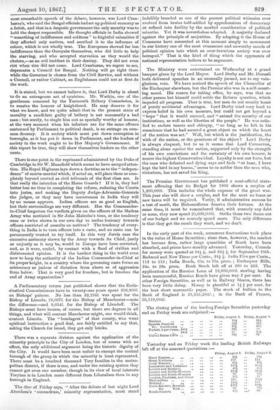There is one point in the reprimand administered by the
Duke of 'Cambridge to Sir W. Mansfield which seems to have escaped atten- tion. His Royal Highness lays down a doctrine as to the " indepen- -deuce" of courts-martial which, if acted on, will place themas com- pletely beyond control as civil tribunals of the 'first class are. Is that really the intention of the Horse Guards ? If it is, they had better lose no time in completing the reform, reducing the Courts into juries, and making the Deputy Judge-Advocate-Generals 'the judges, or they may have occurrences in India they will by no means approve. Indian officers are as good as English, but their surroundings are very different. Has the Commander- in-Chief forgotten the verdicts given on the officers of the Madras Army who mutinied in Sir John Malcolm's time, or the tendency -once or twice shown in our own day to undue leniency towards 'officers convicted of assaults on natives? The tendency of every- thing in India is to turn officers into a caste, and no caste can be permanently trusted to try itself. In this very Jervis case the -excessive acrimony shown by the Army towards. its Chief, justly or unjustly as it may be, would in Europe have been corrected, and, as it were, cooled, by contact with a flood of civilian and disinterested opinion. It is the hardest thing in the world even now to keep the authority of the Indian Commander-in-Chief at its proper height, in a country where the governing caste forms an -aristocracy as jealous of dictation from above as of aggression from below. That is very good for freedom, but is freedom the -end of Army organization?






























 Previous page
Previous page